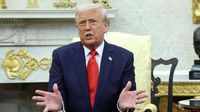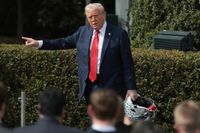In a series of bold statements and actions that have drawn both praise and criticism, President Donald Trump is exploring the legality of deporting U.S. citizens to prisons in Central American countries, while simultaneously facing backlash for freezing significant federal funding to Harvard University.
On April 15, 2025, White House Press Secretary Karoline Leavitt announced during a press briefing that Trump is considering this controversial move specifically for "the most violent, egregious, repeat offenders of crime who nobody in this room wants living in their communities." This statement has sparked a heated debate about the implications of such actions and the moral responsibilities of the U.S. government.
Meanwhile, former President Barack Obama condemned the Trump administration's decision to freeze over $2.2 billion in federal grants to Harvard University, labeling it as "unlawful" and "ham-handed." The administration's freeze comes after Harvard refused to comply with a list of demands aimed at altering its governance and admissions policies, which the university argued would undermine its independence and constitutional rights.
In a related move, Trump hinted at a potential temporary relief from the 25% tariffs imposed on the auto industry. During a press conference, he stated that automakers "need a little bit of time" to adjust their production strategies, particularly concerning relocating manufacturing from Canada and Mexico back to the U.S. This announcement comes amidst ongoing negotiations and pressures from the automotive sector, which has been affected by the trade war.
As the Trump administration grapples with these contentious issues, the implications of their policies are becoming increasingly evident. The proposed deportation of U.S. citizens to foreign prisons raises significant legal and ethical questions. Legal experts are concerned about the potential violations of civil rights and the precedent it could set for future administrations.
In addition, Trump's threats to revoke Harvard's tax-exempt status over its refusal to comply with federal demands have ignited discussions about the role of educational institutions in governance and their rights to operate independently of political pressure. Harvard's leadership has maintained that they will not compromise their principles, even in the face of substantial financial repercussions.
As the political landscape continues to evolve, the ramifications of these actions are likely to reverberate through various sectors including education, law, and civil rights. The administration's approach to these issues reflects a broader strategy aimed at consolidating power and reshaping the relationship between the federal government and institutions of higher learning.
Furthermore, the ongoing scrutiny of Trump's policies is compounded by a preliminary FY2026 budget proposal that suggests closing 10 embassies and 17 consulates worldwide, a move that critics argue would diminish the U.S. diplomatic presence and influence globally.
In a separate but related development, a Maryland District Judge, Paula Xinis, has ruled that lawyers for a man wrongfully deported to El Salvador will be allowed to depose Trump administration officials. This decision follows a Supreme Court ruling that mandated the administration to facilitate the man's return from a brutal prison in El Salvador. Judge Xinis instructed government lawyers to "cancel vacations, cancel other appointments" in order to comply with this order, highlighting the legal challenges the administration faces regarding its immigration policies.
In a different context, a Palestinian man arrested at a Vermont immigration office while seeking to finalize his U.S. citizenship expressed relief that he has not been moved out of state, according to his attorney. This case underscores the complexities surrounding immigration enforcement and the rights of individuals navigating the U.S. immigration system.
As Trump continues to navigate these contentious issues, the administration's approach to governance and policy-making remains under intense scrutiny. The implications of these actions will likely play a significant role in shaping the political landscape as the nation moves closer to the next election cycle.
Moreover, the debate surrounding Medicaid cuts proposed by Republican leadership, which could adversely affect young Americans, adds another layer of complexity to the ongoing political discourse. Speaker Mike Johnson has suggested that the GOP is considering cuts that could impact the expansion of Medicaid, a move that many fear will disproportionately affect low-income populations.
As the administration grapples with these multifaceted challenges, the public and political response will be crucial in determining the trajectory of these policies. The intersection of education, immigration, and healthcare policy under the Trump administration is creating a dynamic and often contentious political environment.
Ultimately, the decisions made in the coming weeks and months will not only affect the immediate landscape but could also have long-lasting implications for the future of American governance and civil rights.



